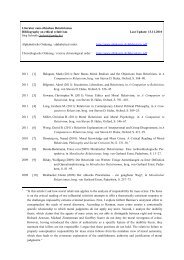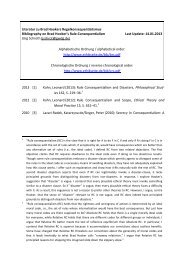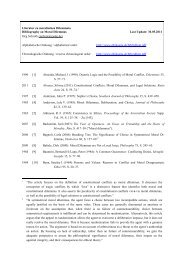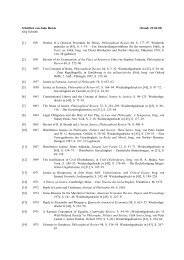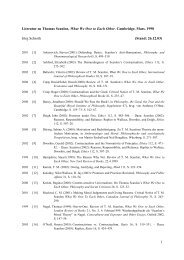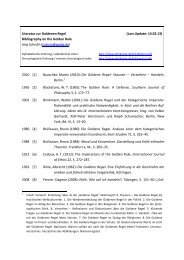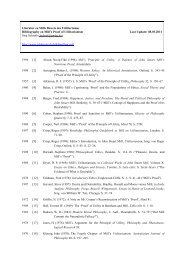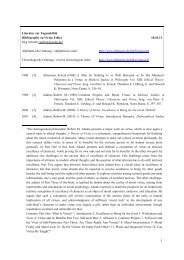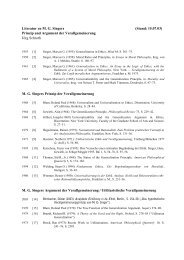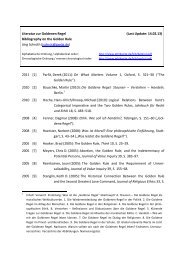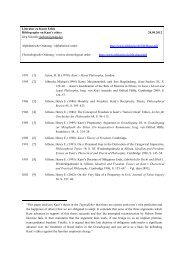Chronologische - Ethikseite
Chronologische - Ethikseite
Chronologische - Ethikseite
You also want an ePaper? Increase the reach of your titles
YUMPU automatically turns print PDFs into web optimized ePapers that Google loves.
2004 [465] Sala, Giovanni B. (2004): Kants „Kritik der praktischen Vernunft“. Ein Kommentar,<br />
Darmstadt.<br />
2004 [466] Sensen, Oliver (2004): Kants Begriff der Menschenwürde, in Abwägende Vernunft. Praktische<br />
Rationalität in historischer, systematischer und religionsphilosophischer Perspektive,<br />
hrsg. von Franz-Josef Bormann und Christian Schröer, Berlin, S. 220–36.<br />
2004 [467] Stern, Robert (2004): Does ‘Ought’ Imply ‘Can’? And Did Kant Think It Does?, Utilitas 16, S.<br />
42–61. 125<br />
2004 [468] Sturma, Dieter (2004): Kants Ethik der Autonomie, in Kants Ethik, hrsg. von Karl Ameriks<br />
und Dieter Sturma, Paderborn 2004, S. 160–77.<br />
2004 [469] Trampota, Andreas (2004): Autonome Vernunft mit moralischer Sehkraft. Die<br />
Komplementarität von Allgemeinem und Besonderem bei Immanuel Kant, in<br />
Abwägende Vernunft. Praktische Rationalität in historischer, systematischer und<br />
religionsphilosophischer Perspektive, hrsg. von Franz-Josef Bormann und Christian<br />
Schröer, Berlin, S. 203–19.<br />
2004 [470] Velleman, J. David (2004): Willing the Law, in Practical Conflicts: New Philosophical<br />
Essays, hrsg. von Monika Betzler und Peter Baumann, Cambridge, S. 27–56.<br />
Wiederabgedruckt in Velleman, Self to Self. Selected Essays, Cambridge 2006, S.<br />
284–311.<br />
2004 [471] Werner, Micha H. (2004): Kants pflichtenethischer Rigorismus und die Diskursethik: eine<br />
maximenethische Deutung des Anwendungsproblems, in Perspektiven der<br />
Diskursethik, hrsg. von Niels Gottschalk-Mazouz, Würzburg, S. 81–110.<br />
2003 [472] Banham, Gary (2003): Kant’s Practical Philosophy. From Critique to Doctrine, New York.<br />
2003 [473] Baxley, Anne Margaret (2003): Does Kantian Virtue Amount to More than Continence?,<br />
Review of Metaphysics 56, S. 559–86.<br />
2003 [474] Birnbacher, Dieter (2003): Analytische Einführung in die Ethik, Berlin, S. 136–54 („4.3.1<br />
Kants Kategorischer Imperativ“).<br />
2003 [475] Bowman, Curtis (2003): A Deduction of Kant’s Concept of the Highest Good, Journal of<br />
Philosophical Research 28, S. 45–63.<br />
2003 [476] Brinkmann, Walter (2003): Praktische Notwendigkeit. Eine Formalisierung von Kants<br />
Bewußtseins – Das ‚Ich denke’ und das ‚Meine’ – Die Possessivität ‚meiner’ Vorstellungen – H. Rückblick:<br />
Der Status einer Kritik der reinen Freiheit: Die Architektonik des juridischen Modells der Vernunftkritik –<br />
Die Konstitution des ‚mein’ und die Selbstdifferenzierung des moralischen Subjekts – ‚Meine<br />
Vorstellungen’ im apperzeptiven Selbstverhältnis und die Konstitution von Subjektivität aus Freiheit – Die<br />
Kritik der reinen Vernunft aus der Perspektive der Kritik der reinen Freiheit – Zusammenfassung –<br />
Literatur- und Sachwortverzeichnis“<br />
125 “The aim of this article is twofold. First, it is argued that while the principle of ‘ought implies can’ is<br />
certainly plausible in some form, it is tempting to misconstrue it, and that this has happened in the way it<br />
has been taken up in some of the current literature. Second, Kant's understanding of the principle is<br />
considered. Here it is argued that these problematic conceptions put the principle to work in a way that Kant<br />
does not, so that there is an important divergence here which can easily be overlooked.”



